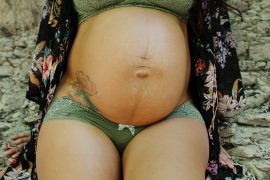By Dr. Dawn Kingston
For many pregnant women, thoughts of postpartum depression raise feelings of fear, dread, and loss of control. Many feel that there is little that they can do to control whether or not they become depressed after they have their baby.
The Great Myth
Over the past twenty years, much of the focus on emotional health in the childbearing years has been solely on postpartum depression. Women and their partners were told to be on the lookout for signs of depression after the baby was born.
Some doctors and nurses assessed women at the 6-week postpartum check-up. But, few thought to look before the baby was born.
What many people don’t know is that women who experience postpartum depression usually have some warning signs while they’re pregnant. Many nurses and doctors who work with pregnant women don’t know this either. In fact, the research about emotional health in pregnancy is actually pretty new.
What You Need to Know: Busting Myths
A recent study of over 1,000 first-time Australian mothers and their children has challenged several myths that we’ve held to about postpartum depression.
This study checked pregnant women for depression in pregnancy, and then again at 3, 6, and 12 months after they had their babies.
When their children were 4 years old, these mothers were checked again for depression, and their children were assessed for emotional and behavioural difficulties.
This study busted 3 major myths:
Myth #1: Mood changes in pregnancy are just part of being pregnant. They’ll go away on their own.
What this study showed: Women who experience depression in pregnancy tend to still have it through the postpartum period and into the early years of childhood. Depression in pregnancy doesn’t simply go away on its own for most women.
The study showed that among the 40% of women who had symptoms of depression in pregnancy, the majority (78%) had roughly the same level of depression from pregnancy right through to when their child started Kindergarten. The other 22% had symptoms that were more severe in pregnancy and continued to worsen as their child grew.











